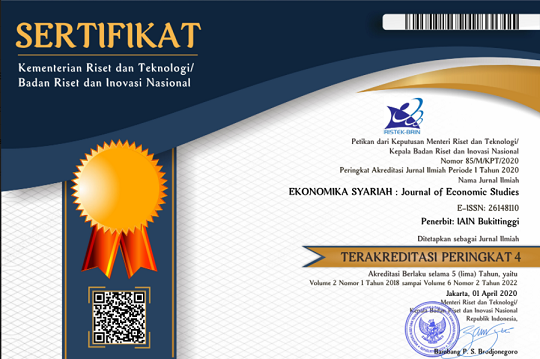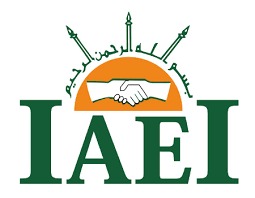Subjective Well-Being, Religiosity, Trust, and Altruism: an Islamic Perspective
DOI:
https://doi.org/10.30983/es.v8i2.8393Keywords:
Subjective Well-Being, Al-Sa’adah , Religiosity , Trust, AltruismAbstract
Subjective well-being (SWB) is often associated with increased productivity, creativity, innovation, and improved social relationships, all of which play a significant role in supporting a country's development. This research was carried out to examine SWB from an Islamic perspective. It also evaluated the importance of religiosity, trust, and altruism to SWB. The library research method was used in this research with data collected from journal articles, books, and the Qur’an. First, journal articles on the topic of SWB from an Islamic perspective were searched. Second, the Qur’an was examined to determine the references to the roles of religiosity, trust, and altruism. Third, the publications on the impact of religiosity, trust, and altruism were reviewed. The topic of SWB, from an Islamic perspective, is associated with happiness, as represented by the terms al-falah and al sa’adah. The implications are for individuals, educators, families, and governments to increase SWB through the enhancement of important indicators. The research strengthens empirical evidence on the positive impact of religiosity, trust, and altruism on SWB. It also proved that Islamic teachings on muamalat (social relations) are universal and provided benefits to non-Muslims.
Individu dengan kesejahteraan subjektif (subjective well-being/SWB) yang baik akan lebih produktif, kreatif, inovatif, dan memiliki hubungan sosial yang baik. Hal tersebut merupakan aspek penting dalam pembangunan suatu negara. Penelitian ini bertujuan untuk menganalisis SWB dari perspektif Islam serta bagaimana peran religiositas, kepercayaan, dan altruisme terhadap SWB. Penelitian ini menggunakan metode studi kepustakaan dengan data berasal dari artikel jurnal, buku, dan al-Qur’an. Pertama, artikel jurnal dengan topik SWB dalam perspektif Islam dibahas. Kedua, peran religiositas, kepercayaan dan altruisme dicari di dalam al-Qur’an. Ketiga, artikel jurnal terkait bukti empiris ketiga variabel tersebut terhadap SWB juga dibahas. Topik tentang SWB dalam perspektif Islam dihubungkan dengan kebahagiaan khususnya dengan istilah al-sa’adah dan al-falah. Implikasi dari penelitian ini adalah untuk individu, pendidik, keluarga, dan pemerintah untuk meningkatkan SWB melalui tiga variabel yang dibahas di sini. Penelitian ini menguatkan penelitian empiris bahwa ada peran positif dari religiositas, kepercayaan terhadap orang lain, dan sifat altruisme dalam meningkatkan kebahagiaan. Penelitian ini juga memberikan bukti bahwa ajaran Islam dalam muamalat (hubungan sosial) bersifat universal dan memberikan manfaat pada manusia bahkan untuk yang tidak beragama Islam.
References
Abdel-Khalek, A. M., & Lester, D. (2017). The association between religiosity, generalized self-efficacy, mental health, and happiness in Arab college students. Personality and Individual Differences, 109, 12–16. https://doi.org/10.1016/j.paid.2016.12.010
Ahmad bin Muhammad al-Shawi. (2016). Hasiyah al-Shawi ala Tafsir Jalalain. Dar al-Kotob Ilmiyyah.
Ahmad Mustafa al-Maraghi. (1946). Tafsir Maraghi. Dar al-Mustafa Halabi.
Ahyani, H., Slamet, M., Ahyani, H., Tobroni, & Tobroni. (2021). Building the Values of Rahmatan Lil ’Alamin for Indonesian Economic Development at 4.0 Era from the Perspective of Philosophy and Islamic Economic Law. Al-Ihkam: Jurnal Hukum Dan Pranata Sosial, 16(1), 111–136. https://doi.org/10.19105/al-lhkam.v16i1.4550
Al Ghazzali. (1910). The Alchemy of Happiness (L Cranmer-Byng & S A Kapadia, Eds.; John Murray, Trans.). Hazel, Watson and Viney.
Allen, S. (2018). The Science of Generosity (Issue May). Greater Good Science Center.
Amiruddin, A., Qorib, M., & Zailani, Z. (2021). A study of the role of Islamic spirituality in happiness of Muslim citizens. HTS Teologiese Studies / Theological Studies, 77(4). https://doi.org/10.4102/hts.v77i4.6655
Aydin, N. (2017). Spirituality and subjective wellbeing: Living a fulfilled life without falling into the trap of consumer culture. Humanomics, 33(3), 300–314. https://doi.org/10.1108/H-03-2017-0052
Azkiya, N., Halimatussa’diyah, H., & Ilyas, D. (2023). Altruism in the Perspective of the al-Qur’an and its Relevance to Philanthrophic Practices in Satu Amal Indonesia Organization. Jurnal Fuaduna : Jurnal Kajian Keagamaan Dan Kemasyarakatan, 7(1), 67. https://doi.org/10.30983/fuaduna.v7i1.6322
Baidhawy, Z. (2012). Distributive principles of economic justice: an Islamic perspective. In IJIMS, Indonesian Journal of Islam and Muslim Societies (Vol. 2, Issue 2).
Barqueta Moreira de Lucena, H., Zanatta, C., Manoel Luiz de Santana, C., Fábio Domingos, L., & Chagas, E. (2021). Altruism and Subjective Well-Being in the Context of COVID-19 Pandemic: A Social Cognition Research. https://doi.org/10.37118/ijdr.23352.11.2021
Conzo, P., Aassve, A., Fuochi, G., & Mencarini, L. (2017). The Cultural Foundations of Happiness. Journal of Economic Psychology, 62, 268–283. https://doi.org/10.1016/j.joep.2017.08.001
Easterlin, R. (1974). The Economics of Happiness. Daedalus Journal of the American Academy of Arts & Sciences, 133, 26–33.
Easterlin, R. (2013). Happiness and Economic Growth: The Evidence. IZA Discussion Paper, 7187.
El-Zeiny, I. (2020). The Semantics and Ethics of Sa’adah (Happiness) in the Qur’an. Islamic Studies, 59(1), 95–113. https://doi.org/10.2307/27088377
Fakhruraddin al-Razi. (1981). Mafatih al-Gaib. Dar al-Fikr.
Feizi, S., Nasiri, M., Bahadori, H., Hosseini Amiri, M., & Mirhosseini, H. (2020). The relationship between spiritual well-being and happiness among healthcare students: Application of the spiritual health questionnaire for the Iranian population. Heliyon, 6(11). https://doi.org/10.1016/j.heliyon.2020.e05448
Feras Hamza. (2021). Tafsir al-Jalalayn.
Frey, B. S., & Stutzer, A. (2002). What Can Economists Learn from Happiness Research? Journal of Economic Literature, 40(2), 402–435. https://doi.org/10.1257/002205102320161320
Graham, C. (2009). Happiness around the World. Oxford University Press.
Graham, C. (2016). Subjective Well-Being in Economics. In M. D. Adler & M. Fleurbaey (Eds.), The Oxford Handbook of Well-Being and Public Policy (pp. 424–450). Oxford University Press. https://doi.org/10.1093/oxfordhb/9780199325818.013.14
Hardini, M., & Wasiaturrahma, W. (2020). Social capital dimensions and individual happiness in Indonesia: The micro-level study. Jurnal Ekonomi Pembangunan, 18(2), 147–162. https://doi.org/10.29259/jep.v18i2.12753
Herijanto, H. (2022). Al amanah in al qur’an vs trust: a comparative study. International Journal of Ethics and Systems, 38(4), 549–575. https://doi.org/10.1108/IJOES-03-2021-0064
Ibnu Katsir. (2000). Tafsir al-Qur`an al-Adzim. Maktabah Aulad Syaikh li Turats.
Imam Qurthubi. (2006). Jami’ LiAhkam al-Qur`an. Muassasah Risalah.
Jeya Bala, Maria Sneha, Prizila, Priya Dharshini, Rashmi, A. A. R., & Sheela, J. I. J. (2013). A Study on Altruism and Subjective Well-Being among Emerging Adults. International Journal of Indian Psychology, 9(3), 1354–1361. https://doi.org/10.25215/0903.126
Joshanloo, M., & Weijers, D. (2019). Islamic perspectives on wellbeing. In Positive Psychology in the Middle East/North Africa: Research, Policy, and Practise (pp. 237–256). Springer International Publishing. https://doi.org/10.1007/978-3-030-13921-6_11
Jovanović, V. (2016). Trust and subjective well-being: The case of Serbia. Personality and Individual Differences, 98, 284–288. https://doi.org/10.1016/j.paid.2016.04.061
Junoh, N., Mustafa Busu, Z., Mustapha, A. M., Mohamad, A. M., & Hashim, N. M. (2022). The Reality of Happiness According to Scholars’ Viewpoints: A Systematic Literature Review (SLR) Analysis. Proceedings, 82(77), 1–14. https://doi.org/10.3390/proceedings2022082077
Kader, H. (2021). Human well-being, morality and the economy: an Islamic perspective. Islamic Economic Studies, 28(2), 102–123. https://doi.org/10.1108/ies-07-2020-0026
Kharisma, B., Remi, S. S., Hadiyanto, F., & Abdurrahman, G. (2020). Happiness and Working Hours in Indonesia. Sosiohumaniora, 22(1), 88–95. https://doi.org/10.24198/sosiohumaniora.v22i1.24248
Kurniawati, N., & Pierewan, A. C. (2020). The Determinants Of Women ’ s Happiness In Indonesia. International Journal of Scientific & Technology, 9(04), 3630–3635.
Maham, R., Bhatti, O. K., & Öztürk, A. O. (2020). Impact of Islamic spirituality and Islamic social responsibility on employee happiness with perceived organizational justice as a mediator. Cogent Business and Management, 7(1). https://doi.org/10.1080/23311975.2020.1788875
Majumdar, C., & Gupta, G. (2015). Don’t Worry, Be Happy A Survey of the Economics of Happiness. Economic and Political Weekly , L(40), 50–62. https://about.jstor.org/terms
Miftahul Jannah. (2016). Konsep Altruisme dalam Perpektif Al-Qur’an [Magister Thesis].
Mustofa, M. (2022). Religiosity and happiness inter generation of labor in Indonesia. Journal of Social Studies (JSS), 18(1), 101–118. https://doi.org/10.21831/jss.v18i1.49027
Mustora Bisri. (2022). Proses Kebahagiaan: Mengaji Kimiya’us Sa’adah Imam Al-Ghazali (1st ed.). PT QAF Media Kreativa.
Omais, S., & dos Santos, M. A. (2022). Happiness in Islam The Role of Religion and Spirituality in Muslims’ Well-Being. In Selected Proceedings from the 1st International Conference on Contemporary Islamic Studies (ICIS 2021) (pp. 207–215). Springer Nature Singapore. https://doi.org/10.1007/978-981-19-2390-6_19
Omar, M. N., Long, A. S., Mahmood, A. R., & Rahman, Z. A. B. (2021). Islamic notion of happiness (Al-Sa’ada): An analysis of Miskawayh’s thought. International Journal of Islamic Thought, 19(1), 49–57. https://doi.org/10.24035/IJIT.19.2021.195
Putri, E. I. S., & Prasetyani, D. (2021). New Evidence of Individual Level of Happiness in Indonesia: Does Easterlin Paradox Matter? Jurnal Ekonomi Dan Studi Pembangunan, 13(1), 5–24.
Ragib al-Asfahani. (2015). Mufradat Fi Garib al-Qur`an (7th ed.). Dar Ma’rifah.
Rakhmawati. (2024). Indonesian Happiness Factor: A Panel Data Analysis. Jurnal Ekonomi Dan Studi Pembangunan, 16(1). https://doi.org/10.17977/um002v16i12024p016
Riyadi, D. S., & Bahreisy, F. (2001). Kimia Ruhani untuk Kebahagiaan Abadi. Zaman.
Rosifah, S. N., Nuryakin, C., & Handalusia, V. (2019). Islamic precepts for marital happiness in indonesia : The role of religiousity and spouse ’ s characteristics. International Journal of Business and Society, 20(April), 19–28.
Rothman, A., Betül Yücesoy, Z., & Yalçın, E. (2024). Early Muslim Scholars’ Conceptions of Character Development and Contemporary Applications in Mental Health and Well-Being. Journal of Muslim Mental Health, 18(1), 62–74. https://doi.org/10.3998/jmmh.6027
Sabjan, M. A. (2019). The Meaning And Experience Of Happiness In Islam An Overview. The Second International Conference on Humanities, 396–402. https://doi.org/10.15405/epsbs.2019.09.44
Sofia, N., & Sari, E. P. (2018). Indikator Kebahagiaan (Al-Sa’adah) dalam Perspektif Alquran dan Hadis. Psikologika: Jurnal Pemikiran Dan Penelitian Psikologi, 23(2), 91–108. https://doi.org/10.20885/psikologika.vol23.iss2.art2
Sofiyurrahman al-Mubarakfuri. (2009). Rahiq al-Makhtum. Dar al-Wafa’.
Stavrova, O., Fetchenhauer, D., & Schlösser, T. (2013). Why are religious people happy? The effect of the social norm of religiosity across countries. Social Science Research, 42(1), 90–105. https://doi.org/10.1016/j.ssresearch.2012.07.002
Tekke, M., Francis, L. J., & Robbins, M. (2018). Religious affect and personal happiness: A replication among Sunni students in Malaysia. In Journal of Muslim Mental Health (Vol. 11, Issue 2, pp. 3–15). Michigan Publishing. https://doi.org/10.3998/jmmh.10381607.0011.201
Utama, R. Y., Palani, H., & Rabbani, A. Z. (2021). Giving more enhances your happiness: Evidence from Indonesia. Communication in Humanity and Social Science, 1(1), 24–34. https://doi.org/10.21924/chss.1.1.2021.8
Villani, D., Sorgente, A., Iannello, P., & Antonietti, A. (2019). The role of spirituality and religiosity in subjective well-being of individuals with different religious status. Frontiers in Psychology, 10(JULY). https://doi.org/10.3389/fpsyg.2019.01525
Wahab, M. A. (2022). Islamic Spiritual and Emotional Intelligence and Its Relationship to Eternal Happiness: A Conceptual Paper. Journal of Religion and Health, 61(6), 4783–4806. https://doi.org/10.1007/s10943-021-01485-2
Wang, Q., Zhi, K., Yu, B., & Cheng, J. (2023). Social trust and subjective well-being of first-generation college students in China: the multiple mediation effects of self-compassion and social empathy. Frontiers in Psychology, 14. https://doi.org/10.3389/fpsyg.2023.1091193
Xiao, J. J., Yan, C., Bialowolski, P., & Porto, N. (2021). Consumer debt holding, income and happiness: evidence from China. International Journal of Bank Marketing, 39(5), 789–809. https://doi.org/10.1108/IJBM-08-2020-0422
Zia, M. Q., Naveed, M., Fasih, T., & Meero, A. R. (2024). Fostering individual behavior through quality of life variables: the role of Islamic work ethics. International Journal of Ethics and Systems, 40(1), 85–102. https://doi.org/10.1108/IJOES-04-2022-0086
Downloads
Submitted
Accepted
Published
Issue
Section
License
Copyright (c) 2024 Rakhmawati, Fajar Atmaja

This work is licensed under a Creative Commons Attribution-ShareAlike 4.0 International License.
Authors who publish with this journal agree to the following terms:
- Authors retain copyright and grant the journal right of first publication with the work simultaneously licensed under a Creative Commons Attribution-ShareAlike 4.0 International License that allows others to share the work with an acknowledgment of the work's authorship and initial publication in this journal.
- Authors are able to enter into separate, additional contractual arrangements for the non-exclusive distribution of the journal's published version of the work (e.g., post it to an institutional repository or publish it in a book), with an acknowledgment of its initial publication in this journal.
- Authors are permitted and encouraged to post their work online (e.g., in institutional repositories or on their website) prior to and during the submission process, as it can lead to productive exchanges, as well as earlier and greater citation of published work (See The Effect of Open Access).












